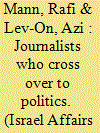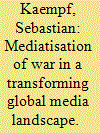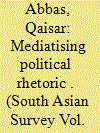| Srl | Item |
| 1 |
ID:
158165


|
|
|
|
|
| Summary/Abstract |
The crossover of journalists to politics is not a novel phenomenon, but in Israel it has intensified in recent years with the increase in the number and the name recognition of the journalists who make the transition. Why do journalists make the transition to politics? Do they make an effective use of their media skills, and how do they perform as parliamentarians? To address these questions, semi-structured interviews were conducted with parliamentary reporters ‒ the main link between parliamentary affairs and the media.
|
|
|
|
|
|
|
|
|
|
|
|
|
|
|
|
| 2 |
ID:
123783


|
|
|
|
|
| Publication |
2013.
|
| Summary/Abstract |
Before the rise of digital new media technology in 2002, 'old' media at its heart displayed a fundamental division between sender and receiver, a division which for a long time had structurally, materially and politically conditioned the nature of the relationship between 'old' media and war. Within the recently emerging digital new media technology, however, this age-old separation between sender and receiver has been eroded. Thus, alongside traditional media platforms, an entirely new form of media technology has arisen. This development has transformed the hitherto multipolar nature of the old media landscape and has led to a heteropolar global media landscape, in which the relationship between media and war has been altered. By exploring how digital new media poles are forming and old media poles are evolving, this article examines how this seismic shift in the global media landscape requires a redefinition of the understanding of the nature of the relationship between media and conflict today.
|
|
|
|
|
|
|
|
|
|
|
|
|
|
|
|
| 3 |
ID:
155175


|
|
|
|
|
| Summary/Abstract |
The mediatisation of politics has been a dominant theory in the field of political
communication for some time, proposing that the mass media in democratic
societies tend to dominate the political process. This research intends to explore
the media-politics nexus as part of the protest campaign in 2014 in Pakistan,
also known as the long march. Specifically, it analyses dynamics of the political
rhetoric of protesting leaders and dimensions of the two selected TV talk shows.
Using textual analysis as research methodology, this article concludes that by
transforming the political theatre into a media theatre, the talk shows effectively
mediatised the long march. TV news became part of the political process, rather
than covering it objectively, either by supporting or opposing the long march.
The two top political leaders of the long march voluntarily adopted media logic
as a rhetorical strategy to offer a readymade product for media coverage.
|
|
|
|
|
|
|
|
|
|
|
|
|
|
|
|